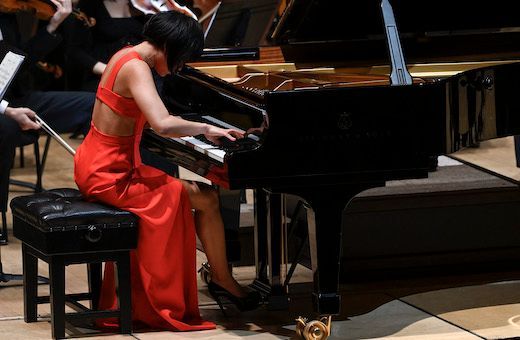In its promotional material for this concert, the Barbican made a big play that star pianist Yuja Wang was taking “second billing” to the Czech Philharmonic. I’m not entirely sure the audience was on board with this messaging, judging by a hall packed out with plenty of younger fans eager to witness their heroine tackle Rachmaninov’s First Piano Concerto. There’s always a buzz about Wang’s London appearances, her ability to draw in new audiences generates a tangible excitement, a sense of anticipation. Nobody puts Yuja in the corner. Or second on the bill.

And she fully delivered the goods. Rachmaninov fits her virtuosic style and flamboyant temperament like a glove. She has long impressed in the composer’s two most famous concertos – the Second and the Third – and the devilish wit of the Rhapsody on a Theme of Paganini. Now she has added the First to her repertoire, an early work begun when Rachmaninov was still a student at the Moscow Conservatoire. The composer revised it in 1917, shortly before emigrating from Russia in the aftermath of the Revolution, and the result – played here – is tighter and more polished than the original version.
Never one to rush, conductor Semyon Bychkov set off the horn fanfare at a leisurely tempo, Wang responding with muscular tone as she chiselled out her opening recitative. But as well as the familiar attack and razor-sharp fingerwork, there was great introspective poetry in her shaping of phrases and an expansive first movement cadenza that was played in the grand manner. A nasal bassoon briefly scotched the dreamy mood Wang created in the Andante cantabile, but the big string tune crept in beautifully. She dazzled in the quicksilver finale, which crackled with energy. Despite a clamorous reception, the Yuja pilgrims were denied an encore.
Credit to them though, as many more stayed in the hall for the mammoth second half – Smetana’s Má vlast – than I had expected and they were treated to a noble reading. The six symphonic poems celebrate the composer’s beloved Czech homeland but here, in Bychkov’s address, they were dedicated to a different homeland, the people of Ukraine.
It’s a mere hop – just 500km – from Budapest to Prague, yet the colours of those two cities’ most prestigious orchestras could not be more varied. Having recently heard the Budapest Festival Orchestra across the Thames, it was fascinating to encounter the Czech Philharmonic here in one of its signature works. Where the Budapest strings have a mitteleuropäisch – essentially Viennese – roundness and sweetness, the Czechs look eastwards. There’s almost a slavic bite and darkness to their sound, a weightiness that suited Bychkov’s approach.
When an orchestra like the Czech Phil plays a staple like Má vlast, there’s always the danger of routine creeping in, but this account was one where you felt the players’ deep love and respect for the music. Bychkov favoured nobility and nostalgia over dramatic excitement – Vyšehrad stood in granite defiance and the tributaries of the Vltava were nudged and nurdled into life – although, after a wheezy clarinet cadenza, the coda to Šárka sprang into action.
With the Rachmaninov concerto as prelude, it made for a long old evening and fresh woodwind and brass players were brought off the subs’ bench for the last three symphonic poems. It’s here that Smetana’s inspiration occasionally flags, the tub-thumping brass repetitive in the interlinked Tábor and Blaník. Bychkov pressed home hard here, returning to Vyšehrad’s mighty theme for an impressive close. The Yuja fans rose to their feet. Perhaps the Barbican’s marketing people were right.


